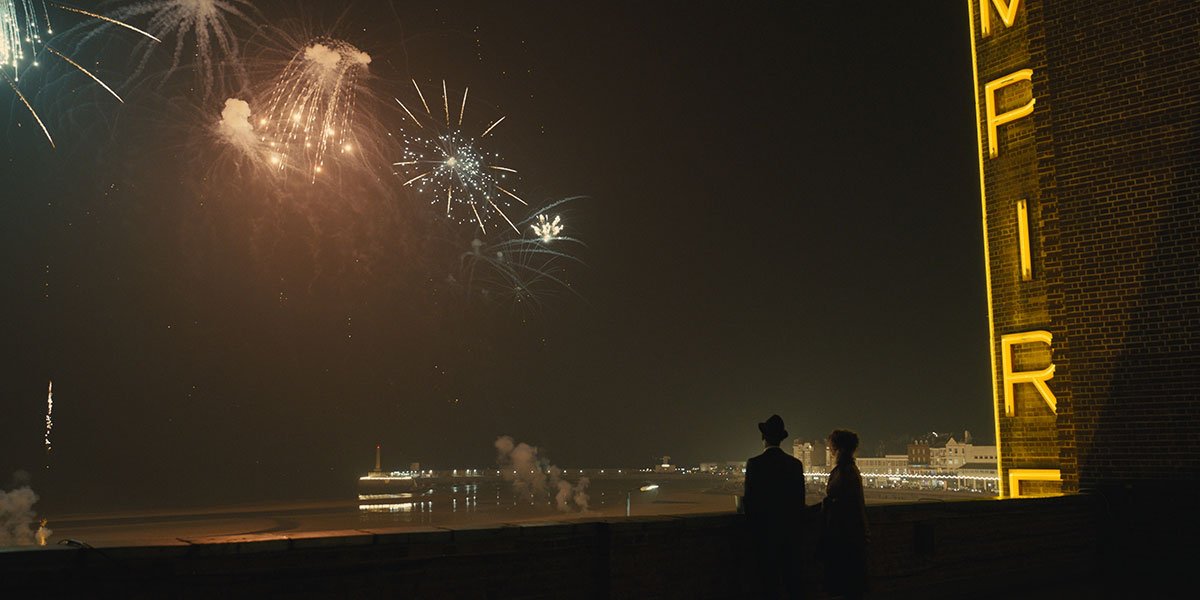Empire of Light: Sam Mendes’ Valentine to Movie Houses Crowded But Captivating
By Thom Ernst
Rating: B
After the impressive but gimmicky single-shot trickery of 1917, director Sam Mendes returns to tell an epic story of a different kind. The result is Empire of Light, a tale that unwinds with such a dizzying rush of emotion and conflict that its effect can only be genuinely gauged after the film ends.
It helps that the film stars Olivia Colman in yet another award-grabbing performance as Hilary, a woman living at a time when mental illness was dismissed as a character flaw and #MeToo too was your-own-fault.
Mendes’ Empire of Light recreates a coastal England town in the 1980s vividly realized with dampened boardwalks set under a sky permanently set to rain. There is, in this town, a grand theatre, the kind that survived the heyday of the big-screen film going, but a theatre that those of us sitting in the comfort of 2022 realize will soon be earmarked for closure.
The film begins with Hilary's return to the theatre after what is presumed to be an unspecified breakdown. At first, not much is known about her absence and why her coworkers, who are (mostly) caring and supportive, treat her with the quiet resolve of being around a souffle at risk of collapse.
But there is more to Hilary's fragility than her illness. Hillary, a single middle-aged woman — at a time when being single and middle-aged came with its own baggage — watches as life seems to unfold without her. Her existence appears to rest solely on the inappropriate attention of her boss, a sleazy narcissist played with understated villainy by Colin Firth.
But Hillary has renewed hope when a handsome new employee (Micheal Ward) takes an interest in her.
Empire of Light is one of two films released over the holidays, both likely to be Oscar contenders and both devoted to celebrating film. The other movie is Steven Spielberg's The Fabelmans. But The Fabelmans, as so accurately pointed out by Original-Cin writer Karen Gordon, feels dedicated to the memory of the director's parents and moviemaking.
In contrast, Empire of Light is a constant reminder of Mendes's passion for cinema and movie houses. In one scene, a demonstration turns violent while the staff watch from the security of the theatre. But the effect is devastating when the demonstrators violate their safe place.
Mendes likely means for the scene to reflect the social unrest of the era but inadvertently reminds us that the sanctuary of the theatre (a church to some) is temporary, and perhaps we are on the verge of losing it altogether.
Yes, this is Mendes’ tribute to movies in so much as he sets the story in a movie theatre and entwines the lives of its staff as they weave past Hilary's gaze. There are moments in the movie where the poetry of film is realized through something as inspired as the grand entrance of the theatre lobby.
Other times the art of cinema — magic if you wish — reflects a spiritual connection, mainly when expressed through Norm (Toby Jones), the film's projectionist. Jones, criminally underused in film, is the film’s second backbone aside from Hillary.
Empire of Light occasionally trips over its efforts to check all the boxes: mental illness, misogyny, racism, and cinema magic. That's a lot to process despite the film two-hour running time (minus a minute), and Mendes isn't always on top of a narrative that moves, sometimes unsteadily, through the lives and times of the characters.
And yet, given time and distance, this same deluge of themes and multiple storylines can be invigorating. It’s possible to leave the theatre unaffected only to look back at Empire of Light with affection. And it’s the movie’s ability to linger unnoticed until surfacing with a revised and unexpected understanding that is at the heart of movie magic.
Empire of Light. Directed by Sam Mendes. Starring Olivia Colman, Micheal Ward, Toby Jones and Colin Firth. Opens in select theatres December 9.



